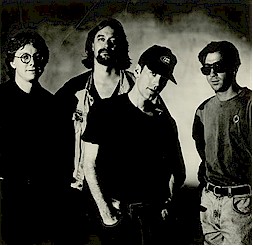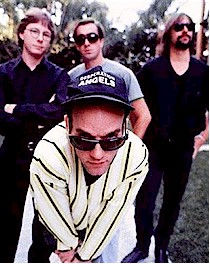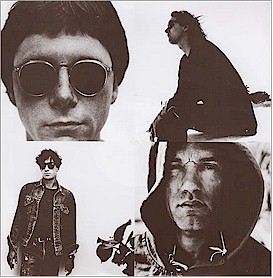 R.E.M. were my Beatles. I mean, the Beatles were my Beatles, too, but if I have to name one band active in my generation that had a similar effect on me to the one the Beatles had on their fans in the Sixties—the initial impact, followed by years of songs and albums that challenged me and made me tap my foot and occasionally do little Thom Yorke dances around whatever room I was in—I’m naming R.E.M. U2 came close—they were another band that wrote great songs and filled big places with righteous noise, but I didn’t get into them until pretty much everybody had gotten into them (around the time of Live Aid and ”Pride [in the Name of Love]”) and their early stuff I still find spotty. Other similar bands of the era—like Depeche Mode, the Smiths, and the Cure—I grew to love over time, but I did not click with them the way I clicked with R.E.M.
R.E.M. were my Beatles. I mean, the Beatles were my Beatles, too, but if I have to name one band active in my generation that had a similar effect on me to the one the Beatles had on their fans in the Sixties—the initial impact, followed by years of songs and albums that challenged me and made me tap my foot and occasionally do little Thom Yorke dances around whatever room I was in—I’m naming R.E.M. U2 came close—they were another band that wrote great songs and filled big places with righteous noise, but I didn’t get into them until pretty much everybody had gotten into them (around the time of Live Aid and ”Pride [in the Name of Love]”) and their early stuff I still find spotty. Other similar bands of the era—like Depeche Mode, the Smiths, and the Cure—I grew to love over time, but I did not click with them the way I clicked with R.E.M.
I bought Murmur when I was 13 or 14—on the recommendation of Rolling Stone and a dozen other music magazines I was reading—and for the longest time, it was the weirdest album in my collection, which consisted mostly of classic rock, arena rock, and pop radio fodder. For the span of my teens, every year brought a new R.E.M. record; it’s not overstating it to say I grew up with the band, from the beautifully twangy Reckoning; through the cold, dark folk rock of Fables of the Reconstruction; through the arena rock moves of Lifes Rich Pageant and Document; to the glorious amalgam of noise and contemplation that was Green. They formed a significant portion of my life’s soundtrack. By the time Out of Time and “Losing My Religion” hit Number One, I was in my twenties and the band was hitting its commercial stride.
It’s the record the band released after those biggest of hits that affected me most and, I believe, will stay with me until either my ears or heart stop working. Automatic for the People dropped midway through my final semester as an undergraduate, and its air of finality and sadness matched my dour mood and sense of impending disconnection as I contemplated graduation and the uncertainty of life thereafter. Of course, life wasn’t all goth vibes and gloom, but Automatic had them, and more, in spades.
 The first thing I and, probably, many others thought the first time through the record was, ”Oh, my God, Michael Stipe is dying.” We’d lost Freddie Mercury to AIDS-related illness the previous year, after seeing stark visual evidence of his decline for nearly ten months, as videos and other promotional materials for Queen’s Innuendo album (not to mention tabloid photos) showed him to be thin and very obviously weakened. The review cassette of Automatic for the People that arrived at my desk at the college newspaper was accompanied by a glossy black-and-white photo of the band, fronted by a pale, thin, rather sickly-looking Stipe. I distinctly remember seeing it and mumbling, ”Oh, shit,” attracting the attention of another editor who took one look at the picture and immediately echoed my concern.
The first thing I and, probably, many others thought the first time through the record was, ”Oh, my God, Michael Stipe is dying.” We’d lost Freddie Mercury to AIDS-related illness the previous year, after seeing stark visual evidence of his decline for nearly ten months, as videos and other promotional materials for Queen’s Innuendo album (not to mention tabloid photos) showed him to be thin and very obviously weakened. The review cassette of Automatic for the People that arrived at my desk at the college newspaper was accompanied by a glossy black-and-white photo of the band, fronted by a pale, thin, rather sickly-looking Stipe. I distinctly remember seeing it and mumbling, ”Oh, shit,” attracting the attention of another editor who took one look at the picture and immediately echoed my concern.
The stark meditations on death and dying we all heard on the album seemed to reinforce that concern. The record is anchored by a handful of beautiful meditations on passage, from age to age, from sadness to coping, or from one world to another. The first of these, “Try Not to Breathe,” is a midtempo deathbed soliloquy whose purpose seems to be to comfort those left behind. Stipe gives voice to the protagonist, who attempts to allay any possible fear by feigning control—
I will try not to breathe
This decision is mine.
I have lived a full life
And these are the eyes that I want you to remember
Again and again, he asserts dominion over the situation—”I can hold these inside,” “I will hold my breath / Until all these shivers subside,” “I have seen things you will never see.” All the while, behind him, the background vocals lift and fly, letting the listener know the end is not far, that if anything waits beyond this life, he is slipping toward it in that moment.
We’re at the funeral in “Sweetness Follows.” I imagine the speaker in this song—different from the one in “Try Not to Breathe,” but perhaps related—gazing in the mirror, straightening his tie, pondering the imponderable, dealing with the tasks before him, the cloud that’s descended upon him. His family—his parents, his siblings—are on his mind, and he’s “ready to bury” one of them. “What did you think when you lost another?” Stipe sings, accompanied by a guitar drone, “What would you think if you lost the other?” The distance present in these relationships is real, never more so then at this end, but, he comforts, “Sweetness follows.” Is it the sweetness of one’s leaving one plane of existence for another? Is it the sweetness of relegating these troubling people to merely pleasant memories? The meaning isn’t clear, and clarity is important, if difficult to achieve, though he tries in the next verse, and nearly succeeds:
It’s these little things, they can pull you under
Live your life filled with joy and wonder
I always knew this altogether thunder
Was lost in our little lives
 Our place in this world—in its vastness, its depth—is infinitesimal. We leave behind scant proof of our presence— a headstone, a place in a box, buried a man’s height underground. Yet, that which comes before our death can be wondrous, if we allow it to be—filled with joy and wonder (or thunder, in the next verse), with friends who will miss us, loved ones who will mourn us, people who will remember us after we’re tucked away in the dirt. And sweetness follows. It’s what we have to believe, that there’s some good in it all, some reward, some comfort.
Our place in this world—in its vastness, its depth—is infinitesimal. We leave behind scant proof of our presence— a headstone, a place in a box, buried a man’s height underground. Yet, that which comes before our death can be wondrous, if we allow it to be—filled with joy and wonder (or thunder, in the next verse), with friends who will miss us, loved ones who will mourn us, people who will remember us after we’re tucked away in the dirt. And sweetness follows. It’s what we have to believe, that there’s some good in it all, some reward, some comfort.
Comfort is also peddled in “Everybody Hurts,” the extraordinary ballad that builds from quiet contemplation to a full-chested exhortation of survival, bolstered mightily by a swell of strings (arranged by John Paul Jones). The tick-tocky drum machine and typical Peter Buck arpeggios provide wonderful cover for what is to come late in the song—the steady ratcheting of drama to the “don’t throw your hand” line after the second verse, then the fallback to quietude, before the amazing “Hold on” at the song’s conclusion, followed by the relentless swell of orchestration. The dynamics of the track are breathtaking; I still get chills when I hear it.
Twixt many of these moments of starkness and beauty, the band seeds its record with facile, if incongruous, uptempo songs, veering from the nonsensical “The Sidewinder Sleeps Tonite” to the compressed arena rock of both “Monty Got a Raw Deal” and the bitter, Bush-heckling “Ignoreland” (released just in time to soundtrack Bush the Elder’s defeat at the hands of Bill Clinton and, to a lesser but still significant extent, Ross Perot). There’s also the at-once-amusing, but eventually aggravating “Man on the Moon.” Yes, the first time I heard Michael Stipe imitate Vegas Elvis and sing about Andy Kaufman, I laughed. The second time was just as funny. By the time the thing became a hit, though, I’d had enough, and it’s the only song on the record I navigate around, whether by lifting the needle or tapping the “Next” button. Not so “Drive,” the album’s opening track and first single, which is still alluring for its incongruity—a call to fun and adventure and rebellion, aimed squarely at the teenage listener (even quoting from David Essex’s “Rock On,” as cheesy a teen anthem as has ever been sung), wrapped in the moody strings and ringing guitars that shade the dourest songs on the record.
The ringing call to amusement that begins Automatic is a sweet memory by the time we hear the strings tuning and the stately piano intro that brings on “Nightswimming.” A wistful evocation of an evening’s skinnydip among friends, “Nightswimming” so beautifully renders that point of transition between innocence and discovery; really, it’s closer to the discovery side, the cusp of the moment when naked bodies can still slice through chill waters and emerge as though baptized, shivering, still separated—though not for long—from the moment at which they will find warmth in one another.
The speaker is looking back on this scene—a photograph has sent him into a quiet reverie, a recognition of how the most ordinary thing can be rendered extraordinary, and that it must be held onto tightly, in one’s mind and one’s heart. “These things, they go away,” he muses, “replaced by everyday.” That most wonderful of memories defies words, though Stipe tries his best—
I’m pining for the moon
And what if there were two
Side by side in orbit
Around the fairest sun?
That bright, tight forever drum
Could not describe nightswimming
 “That bright, tight forever drum”—that most astonishing of supernatural phenomena, conjured in one’s own mind—even that amazing thing cannot adequately describe that feeling of discovery, of intimacy shared, at the moment just before it becomes a thing, an adult thing, before one must navigate around what is accepted and proper, casting aside that most wondrous, deeply felt experience, for the more hollow experience of what’s acceptable. Perhaps this is part of the sweetness of the earlier song, of the memory made real—maybe this is what we find at the end, the peace of the memory, the realness of the gesture, of the evening, of the water on skin, of a palpable innocence that slips away, if not then, then somewhere further down the line.
“That bright, tight forever drum”—that most astonishing of supernatural phenomena, conjured in one’s own mind—even that amazing thing cannot adequately describe that feeling of discovery, of intimacy shared, at the moment just before it becomes a thing, an adult thing, before one must navigate around what is accepted and proper, casting aside that most wondrous, deeply felt experience, for the more hollow experience of what’s acceptable. Perhaps this is part of the sweetness of the earlier song, of the memory made real—maybe this is what we find at the end, the peace of the memory, the realness of the gesture, of the evening, of the water on skin, of a palpable innocence that slips away, if not then, then somewhere further down the line.
Perhaps this is the body of water Stipe searches for in “Find the River,” Automatic‘s final elegy and benediction. He scatters images of nature—flowers strewn, bergamot, vetiver, coriander, rose of hay—in a figurative river, the ages-old locale where Big Things happen, Deep Thoughts are pondered, and moments of uber-sincere reflection lead one to Big Actions. The locale teeters on clichÁ©, but where else could the record have ended? An album so full with dramatic moments and dour preoccupations has to close at the banks of this river, watched by a man who’s left the road he was on, and the “life that passed before my eyes” to take everything in, and wonder if he still has a place in it all. The song and the album draw to a close with one of Stipe’s most profound lyrics—
Strength and courage overrides
The privileged and weary eyes
Of river poet search naivetÁ©
Pick up here and chase the ride
The river empties to the tide
All of this is coming your way
In six lines, Stipe encapsulates virtually everything that’s come before—the darkness and light, the dreams and memories, the comedy and sadness, the temptation to look back, and the willingness—if not the compulsion—to look forward, even when there appears to be nothing physically in front of him. Step into the water, chase the ride, let it carry you, because it will carry you; you will be carried. Everyone will be carried one day. It’s all coming your way.
Hearing “Nightswimming” and “Find the River,” back to back, for the first time, in the dark of my dorm room, was overwhelming—still one of the most profound listening experiences I’ve ever had, one I took very personally. Still do, I suppose. It’s funny, actually, to think that I still consider a record as popular as Automatic for the People, to be mine alone; I’ve had discussions about the album with many others over the years who have felt the same way—that the record had helped them get through rough patches in their lives, or it was a gift they gave to someone else who was having issues, or who had lost someone or was in the process of saying goodbye to someone. It is a wonderful canvas on which the listener can project his or her unique experiences, an album that resonates deeply with those who hold it close.





Comments